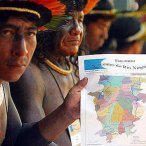
12 November 2012 | Interviews | Resisting neoliberalism | Forests and biodiversity | Human rights
Biodiversity Is Not For Sale
Interview with Friedrich Wulf from Pro Natura-Friends of the Earth Switzerland
Download: MP3 (6.5 Mb)
The main issue discussed at the 11th Conference of the Parties (COP 11) to the United Nations Convention on Biological Diversity was how to finance biodiversity protection, said the Head of International Biodiversity Policy of Pro Natura, Friends of the Earth Switzerland, Friedrich Wulf.
Before the COP held in Hyderabad, from October 8-19, “there was homework every country had to do before the negotiations to assess how much money they spent themselves, how much money they still needed and how much perverse subsidies were already being spent, that means subsidies that damage biodiversity”, said the activist in an interview with Real World Radio. "So the countries did not do their homework. There was no reliable data available”, he regretted.
The CBD entered into force on December 29, 1993, and it has three main objectives: the conservation of biological diversity, the sustainable use of the components of biological diversity and the fair and equitable sharing of the benefits arising out of the utilization of genetic resources.
Wulf has been following the UN negotiations around this very closely in the past years. In the interview with Real World Radio he mentioned that in the previous COP on Biological Diversity held in 2010 in Nagoya, Japan, there were some major decisions, such as the development of a 20-target strategic plan on how to save biodiversity, to have a protocol against biopiracy and to upscale biodiversity finance.
Drawing from the outcomes of Nagoya the aim of the COP in Hyderabad was to set concrete targets, i.e. how much more money would be spent on biodiversity, according to Wulf. To reach this point the member states first had to know how much money is already being spent so there is a baseline. But the countries “did not do their homework”.
Despite this, the campaigner said that after two weeks of intense negotiations the CBD member states managed to fix targets. For example, they now agreed to double biodiversity finance by 2015.
Even though he believes this is not enough money to do everything that is necessary in terms of biodiversity protection, he said it is a start and a step in the right direction.
With reference to this, he said: “We would like to see now that national countries start to implement this decision, that they indeed take action so that more money is available for saving biodiversity”.
Where does the money come from?
Wulf said that the view of Friends of the Earth is that biodiversity should be funded with public sources (e.g. taxes). In his own words: “Public money for public goods”.
He said at the previous COP held in Nagoya “there has been quite a debate to use so called innovative financial mechanisms (IFM) to get that money, and among them are offsetting mechanisms, indeed mechanisms that would put a price on nature like the green development mechanisms”. We are very unhappy if money is derived from those sources, because it could lead to privatization and commodification of nature. So we reject that”, highlighted Wulf.
Even though he said there were no major decisions taken in Hyderabad on this issue, the door on IFMs has not been closed.
About the issue of corporate capture at the UN, a phenomenon that happens very often at the UN climate negotiations, which has been denounced by Friends of the Earth International, Wulf said the process at the COP on Biological Diversity is quite different “(It) has always been very participative. There are many opportunities for NGO and indigenous peoples to make themselves heard They are able to raise concerns even during negotiations. It can be quite spontaneous”, he assessed.
About the moratorium against geo-engineering and terminator technology, which generates second generation sterile seeds and was an issue tabled during the last two COPs on Biological Diversity, Wulf said the situation has not changed and that the moratorium is going to continue.
However, he mentioned there are some countries that fail to apply this moratorium on geoengineering. The recent example, very much discussed at the COP in Hyderabad was that of Canada, which has large-scale iron ocean fertilization (one of the geoengineering forms) on the Pacific coast, adjacent to indigenous lands. This is a source of concern since the decisions that have been taken are not implemented, said Wulf.
Finally on the participation of Switzerland at the COP, the Pro Natura – Friends of the Earth Switzerland activist mentioned that his country’s intervention was quite constructive, although Switzerland made a strong point that unless there are clear numbers of how much money is needed they refuse to pledge for any additional money This position, in Wulf’s opinion, threatened to reach an agreement at all on biodiversity finance: “Luckily we convinced them not to block, but they are not really supportive of raising biodiversity finance, so we will need to talk with them so they will change their position”, he concluded.
Photo: http://bloglemu.blogspot.com







